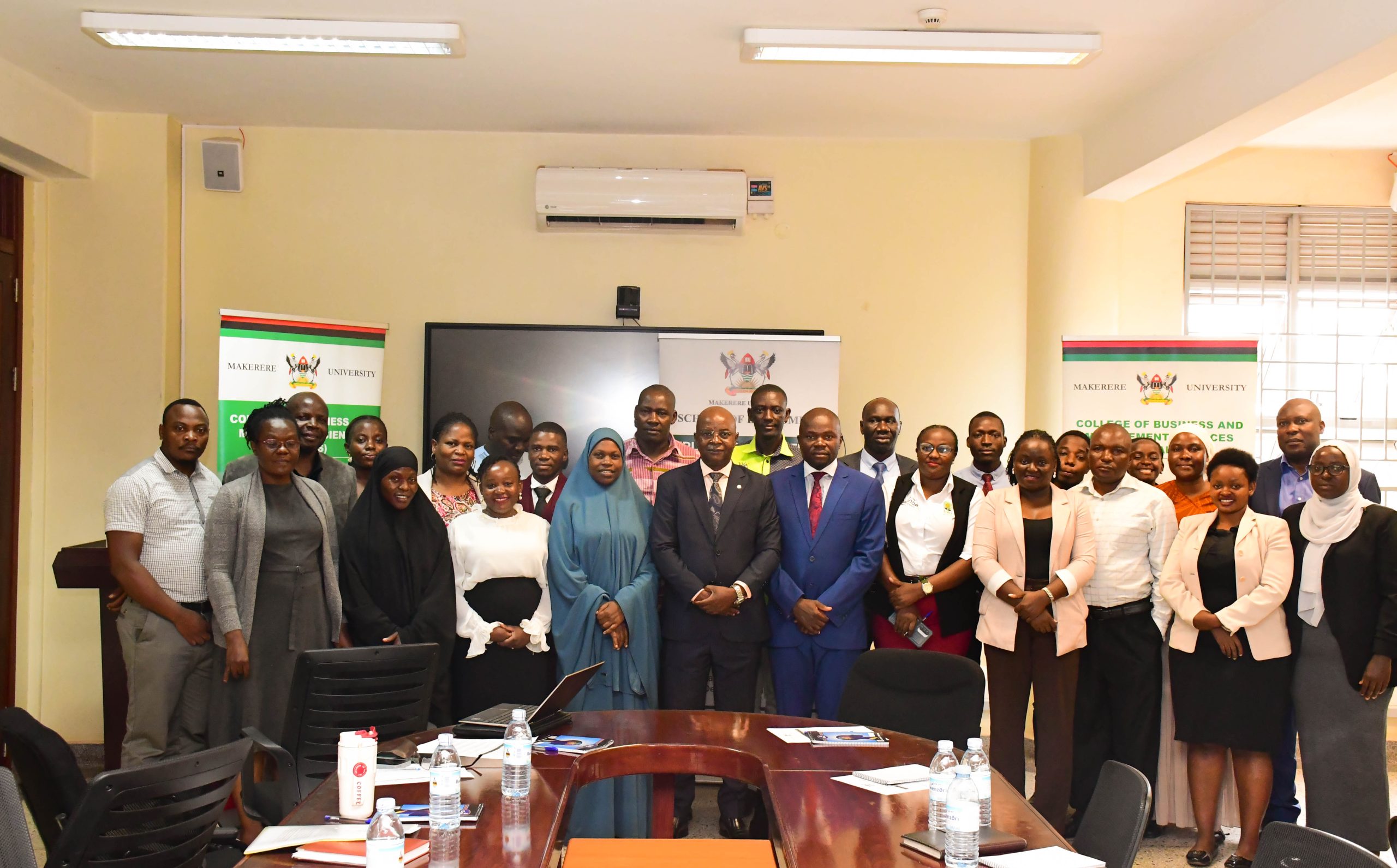October 28, 2025: Makerere University is implementing a research initiative aimed at harmonizing economic expansion with environmental conservation, through a project titled: “Exploring the Option for Co-existence of Mabira Forest and the Booming Economic Activity.”
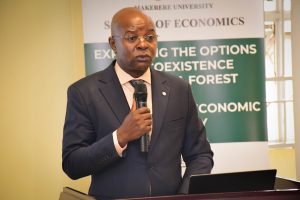
Speaking at the project’s inception workshop, Professor Edward Bbaale, the Principal of the College of Business and Management Sciences (CoBAMS), commended the School of Economics research team for their commitment to tackling one of Uganda’s most pressing sustainability challenges-balancing livelihood opportunities with forest preservation.
“Makerere University has made a bold and strategic resolution to become a research- and innovation-intensive university,” Prof. Bbaale said. “The research agenda emphasizes generateing new knowledge and translating it into practical solutions for national development.”
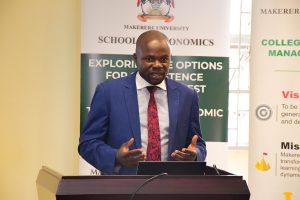
Professor Bbaale congratulated the lead researchers — Assoc. Prof. Ibrahim Mike Okumu, Dr. Aisha Nanyiti, Dr. Salmon Mugoda, and Mr. Dennis Karuhanga — for winning a competitive grant under the Makerere University Research and Innovations Fund (MakRIF) funded by the Government of Uganda. He emphasized that their project represents the spirit of the university’s new research-led agenda.
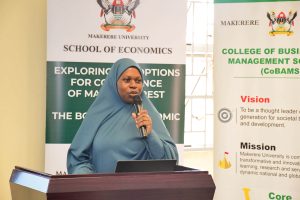
“This achievement is not only a demonstration of personal and team excellence,” Prof. Bbaale noted, “but also an affirmation of the School of Economics’ growing reputation as a centre of thought leadership in policy-driven and impactful research.”
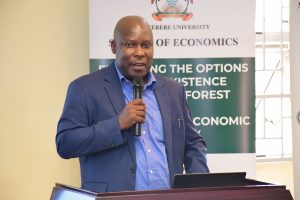
Driving Uganda’s Sustainable Development Vision
The research, conducted in partnership with the National Forestry Authority (NFA) and other stakeholders, seeks to address the delicate balance between economic expansion and environmental conservation — a central pillar in Uganda’s Vision 2040 and the forthcoming National Development Plan IV (NDP IV).
Professor Bbaale highlighted that initiatives such as Makerere University Research and Innovation Fund (MakRIF) are empowering Makerere researchers to contribute to national priorities through evidence-based insights that inform government policy and sustainable development.
He added that CoBAMS has already instituted an internal research grant for faculty members, resulting in more than 60 working papers in the 2024/2025 academic year. A forthcoming CoBAMS Working Paper Series will serve as a platform for scholarly debate, knowledge sharing, and publication.
“Engaging policy actors should not compromise academic rigor,” Professor Bbaale guided. “Rather, it should enrich our work, ensuring that high academic standards are maintained while our research also informs real-world decision-making.”
He encouraged Makerere faculty to continue writing grant-winning proposals and leveraging both local and international funding opportunities.
“The world is ready to support impactful ideas,” he said. “Our role is to translate those ideas into evidence that drives policy and practice.”
Professor Bbaale urged participants to engage deeply during the workshop and to challenge assumptions with the aim of strengthening the study’s design and outcomes.
“This workshop is not a formality,” he declared. “It is an opportunity to shape the intellectual direction, methodological rigor, and policy relevance of this entire research project.”
He concluded by officially declaring the workshop open, expressing confidence that the findings will have “both high scholarly value and practical significance to Uganda’s sustainable development agenda.”
Professor Bbaale urged participants to engage deeply during the workshop and to challenge assumptions with the aim of strengthening the study’s design and outcomes.
“This workshop is not a formality,” he declared. “It is an opportunity to shape the intellectual direction, methodological rigor, and policy relevance of this entire research project.”
He declared the workshop officially open, expressing confidence that the findings will have “both high scholarly value and practical significance to Uganda’s sustainable development agenda.”
The inception workshop brought onboard community leaders, researchers, representatives of the Local government, the academia, students, and civil society organizations, all united by the shared goal of advancing Uganda’s sustainable development agenda.
The Mabira Question: Can Nature and Development Coexist?
In his remarks, Associate Professor Ibrahim Mike Okumu, Dean of the School of Economics and principal investigator of the project, delivered a compelling reflection on the complex relationship between human activity and forest conservation.
“The challenge we face,” Associate Professor Okumu said, “is that as humankind enjoys nature, it gets into competition with nature.”
He described Mabira Forest as one of Uganda’s largest and most important ecological assets — spanning over 30,000 hectares located in buikwe district and serving as a habitat for hundreds of bird, butterfly, and mammal species. He pointed out that human encroachment, charcoal burning, agricultural expansion, and timber harvesting have significantly degraded the forest over the years.
“Between 2001 and 2024, we have lost close to 31,000 hectares of forest cover,” he revealed. “The peak loss came around 2017, driven largely by economic pressures such as agricultural expansion and fuelwood extraction.”
Associate Professor Okumu underscored the urgency of developing a co-existence framework — one that allows communities to benefit from the forest’s resources without destroying it.
“We are asking whether it is possible for humankind to live off the forest without necessarily having the forest diminished,” he explained. “You cannot have economic growth without coexistence.”
A Call for Evidence-Based Policy
The project is expected to generate actionable insights to guide national institutions such as the National Forest Authority (NFA), National Planning Authority (NPA), Ministry of Water and Environment (MoWE), and National Environment Management Authority (NEMA).
Associate Professor Okumu emphasized that unchecked deforestation undermines Uganda’s climate resilience, disrupts rainfall patterns, and threatens biodiversity — all of which have direct implications for rural livelihoods and food security.
“Deforestation is not just an environmental problem; it is an economic and social one,” he said. “Every tree lost erodes the resilience of communities and the stability of our climate.
MakRIF commends the Community-centred approach:
Praising the community-centred approach, the Chairperson of Mak-RIF, Professor Fred Masagazi Masaazi, represented by Ms. Winnie Kyamulabi, emphasized the responsiblity of universities to generate solutions that strive to improve the communities they serve.
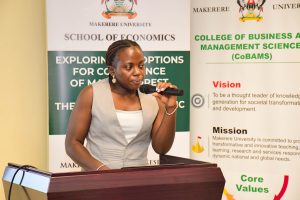
Ms. Winnie Kyamulabi who represented the Chairperson of Mak-RIF, Professor Fred Masagazi Masaazi
Professor Masagazi Masaazi commended the stronger collaboration approach-evidenced by the research team involvement of key partners in the forestry and environmental management in the inception meeting. “Lasting impact requires coordinated action. We might all be tackling the same challenge from different angles – National Forestry Authority (NFA), National Environment Management Authority (NEMA), and academia, but sharing the same goal.”
Highlighting that since 2019, the Government of Uganda through MakRIF has so far supported 1,400 research projects, Ms. Kyamulabi congratulated Associate Professor Ibrahim Mike Okumu and the entire research team, upon winning the grant, which involves a highly competitive process. MakRIF re-affirmed its commitment to the project. “We are ready and eager to support you throughout the research cycle.”
By Ritah Namisango and Moses Kibirango

